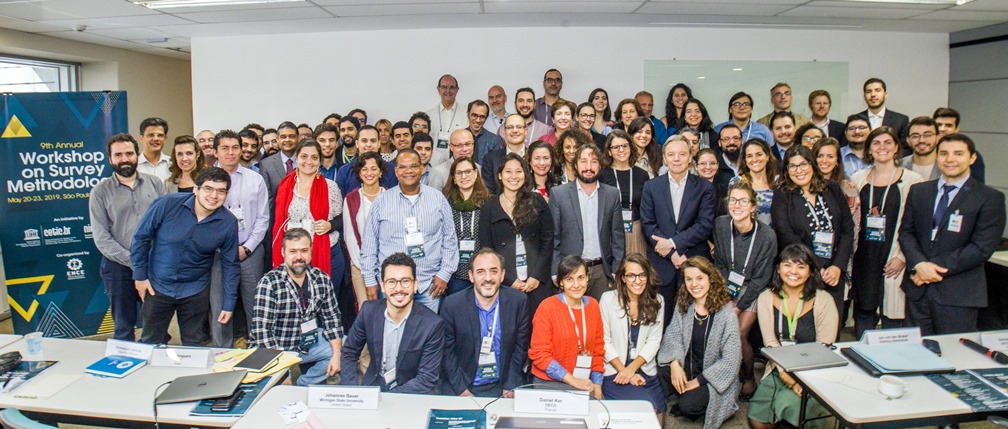Cetic.br and ENCE discuss use of big data and artificial intelligence for the production of public statistics
9th NIC.br Annual Workshop on Survey Methodology gathered participants from 13 countries
How can big data and artificial intelligence be used to support the production and dissemination of public statistics? To answer this and other questions, renowned experts, researchers, public policy makers, representatives of civil society, and international organizations gathered in São Paulo from May 20 to 23 at the 9th NIC.br Annual Workshop on Survey Methodology.
The meeting is an initiative of the Regional Center for Studies on the Development of the Information Society (Cetic.br) of the Brazilian Network Information Center (NIC.br), and for the first time in its ninth edition, was co-organized by the National School of Statistical Sciences (ENCE) of the Brazilian Institute of Geography and Statistics (IBGE). Participants from 13 countries exchanged experiences and had the opportunity to attend lectures and a short course with interactive activities, practical examples, and case studies.
During the event, Dutch expert Jan van den Brakel (Statistics Netherlands/ Maastricht University) presented different research lines on how big data can be used in the production of official statistics, based on projects carried out by Statistics Netherlands. Complementarily, keynote speaker Danny Pfeffermann (Central Bureau of Statistics of Israel) highlighted the advantages and challenges of producing official statistics from different data sources.
Another highlight of the Workshop was the launch of the Portuguese version of the Going Digital Toolkit, a tool from the Organization for Economic Cooperation and Development (OECD) that includes indicators and guidelines that can help countries realize the promises of digital transformation. The toolkit was presented at the event by Daniel Ker (OECD).
Artificial Intelligence
Topics related to the realm of artificial intelligence were also detailed by renowned experts. Based on the experience of Data-Pop Alliance, Emmanuel Letouzé deepened the discussion on how big data and artificial intelligence can help monitor and promote sustainable human development, while Johannes Bauer (Michigan State University) addressed techniques that can support policy formulation, citing, for example, topics like net neutrality and 5G implementation.
On the other hand, the ethical implications of artificial intelligence were highlighted by Diogo Cortiz (Ceweb.br/NIC.br and PUC-SP) and Caitlin Sampaio Mulholland (PUC-RJ). Cortiz emphasized the importance of design to identify people's needs and incorporate them into artificial intelligence systems. “It is important to understand the needs of people in different cultures around the world and incorporate them into artificial intelligence systems to prevent risks of human rights violations and avoid any types of discrimination and biases.”
Additionally, Mulholland highlighted the relevance of biases among technology professionals who develop algorithms. "Machines assume values and operate as dictated by their creators. Today, most programmers in large technology companies are white men. It is easy to see that this kind of workforce will not lead us to reality or accuracy. The consequences are biased artificial intelligence solutions, prejudice, lack of empathy, and potential statistical errors," she warned. One of the alternatives advocated by the specialist is to ensure that programmers recruited for artificial intelligence projects have diverse backgrounds.
In addition to the lectures, the program of the 9th NIC.br Annual Workshop on Survey Methodology hosted on May 22 and 23 the course "Sampling for Quantitative and Qualitative Surveys." Pamela Campanelli (The Survey Coach) explained the importance of good quality sampling and how to implement it, covering aspects such as constructing a sampling frame, types of probability samples, what is sampling error, how to determine sample size, among other issues.
Also during the event, the book“Measuring Digital Health: Methodological Recommendations and Case Studies” was launched, a production of Cetic.br/NIC.br and the Pan American Health Organization (PAHO). The publication aims to foster the production and analysis of data on the adoption, use, and appropriation of information and communication technologies (ICT) in the health sector.
Check out the photo album of the 9th NIC.br Annual Workshop on Survey Methodology:
https://www.flickr.com/photos/nicbr/albums/72157708842365657

This content was automatically translated with the support of artificial intelligence.


